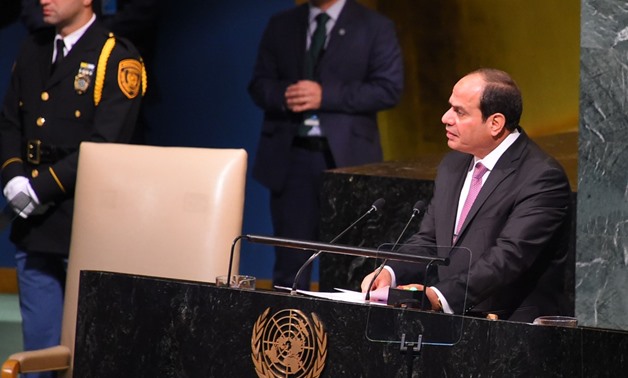
President Sisi gives a speech at the 72nd round of the United Nations Genera Assembly meetings (UNGA 72) in New York- press photo
CAIRO – 20 September 2017: When Hamas had changed its policy to improve relations with Egypt via dispatching itself from the outlawed Muslim Brotherhood, the Inter-Palestinian talks resumed in Cairo and resulted in the formation of a national reconciliation government, begging the question of whether President Abdel Fatah al-Sisi has started pushing Palestinians and Israelis to follow the Egypt-Israel peace example to reach the end of a 69-year-old feud.
On Sunday, Hamas dissolved its administrative committee in the Gaza strip, invited the government of national reconciliation to assume its duties and hold general elections, as per the 2011 Cairo Agreement between Fatah and Hamas, which aimed to unify the Palestinian disputed parties.
Hamas’ decision reflects a soften policy that has changed towards the Israeli-Palestinian cause; in May, a leaked document revealed that the movement has distanced itself from the banned Muslim Brotherhood group, and has accepted a Palestinian state on according to the borders of 1967 (Gaza Strip, West Bank, and East Jerusalem).
Reconciliation was welcomed by Egypt, Fatah, other Palestinian factions, and the Arab League. Both conflicting parts would meet in Cairo for direct talks in the coming few weeks, according to the head of the Fatah negotiation delegation Azam al-Ahmed.
Coincidently, President Sisi urged both the Palestinians and the Israelis to adopt the Egypt-Israel treaty, saying in his speech at the 72nd round of the United Nations General Assembly meetings (UNGA 72) in New York, “I direct my speech to the Palestinian people to stand behind a unified objective, to not differ, to not miss the opportunity, and to accept co-existence with the other.”
“I address Israel that we have a great experience that could be repeated…We are with you to achieve this step,” he continued. He called for closing the Palestinian cause via establishing the state of Palestine on the 1967 borders.
On the sidelines of the UNGA meetings at his residency, Sisi held two separate meetings with Palestinian President Mahmoud Abbas and Israeli Prime Minister Benjamin Netanyahu at the sidelines in New York, to discuss the ways of resuming the peace process talks that had been halted since 2014.
He and President Abbas “agreed to continue intensive consultations and coordination to follow up on the next steps to unite the Palestinian rank so as to contribute to realizing the aspirations of the Palestinian people in ending the rift, building their independent state and creating a better future for the coming generations,” said Egypt’s Presidential Spokesperson in a statement.
In the second meeting with Netanyahu, President Sisi “focused on ways to revive the peace process and establish a Palestinian state, while providing the necessary guarantees to ensure the success of the settlement process between the two sides,” said Egypt’s Presidential Spokesperson Aaa Youssef in a statement, adding that Sisi praised U.S. President Donald Trump Administration’s efforts in this regard.
Sisi’s call for following the Egyptian experience of peace process has been issued in May 2016, saying that the 40-year-old treaty had “real peace and opened a new brightening chapter in the regions’ history.”
His message was repeated for the Israelis at the United Nation General Assembly meetings in 2016, saying that Israel has a real chance towards peace via repeating the Egyptian experience to solve the Palestinians’ cause and establishing their state beside the Israeli state.
However, experts find difficulties in following the Egyptian experience due to Israel’s skeptical stance towards Hamas despite its new policy.
Political science professor at Cairo University, Ahmed Youssef Ahmed, told Egypt Today that the inter-Palestinian reconciliation would complicate the compromise process because Israel never accepts Hamas as direct or indirect part in the negotiation; however, it would enhance the Palestinian side internationally.
“Israel will justify that it would not negotiate with a government that includes terrorists,” he added. The U.S. and Israel consider Hamas movement a “terrorist” organization.
A unified government will end Israeli “justification for refuting talks over peace process amid the state of division,” said Rahka Ahmed Hassan, member at the Egyptian Council for Foreign Affairs (ECFA) and former minister assistant for foreign affairs, told Egypt Today on Monday.
The national unity government is a step that strengthens Palestine’s stance internationally to fight for the establishment of their state, he added.
When Hamas and Fatah reconciled in April 2014 and agreed on a unified government, Israeli Prime Minister Benjamin Netanyahu called on the international world to refrain from recognizing the 2014 unity government; asking Abbas to choose between either reconciliation with Hamas or peace with Israel.
Thus, following the Egyptian-Israeli peace example boils down to whether Israel can accept Hamas in the talks or not, and whether it would actually seize building settlements in the West Bank and East Jerusalem to allow the Palestinians to establish their state on the borders of 1967.


Comments
Leave a Comment